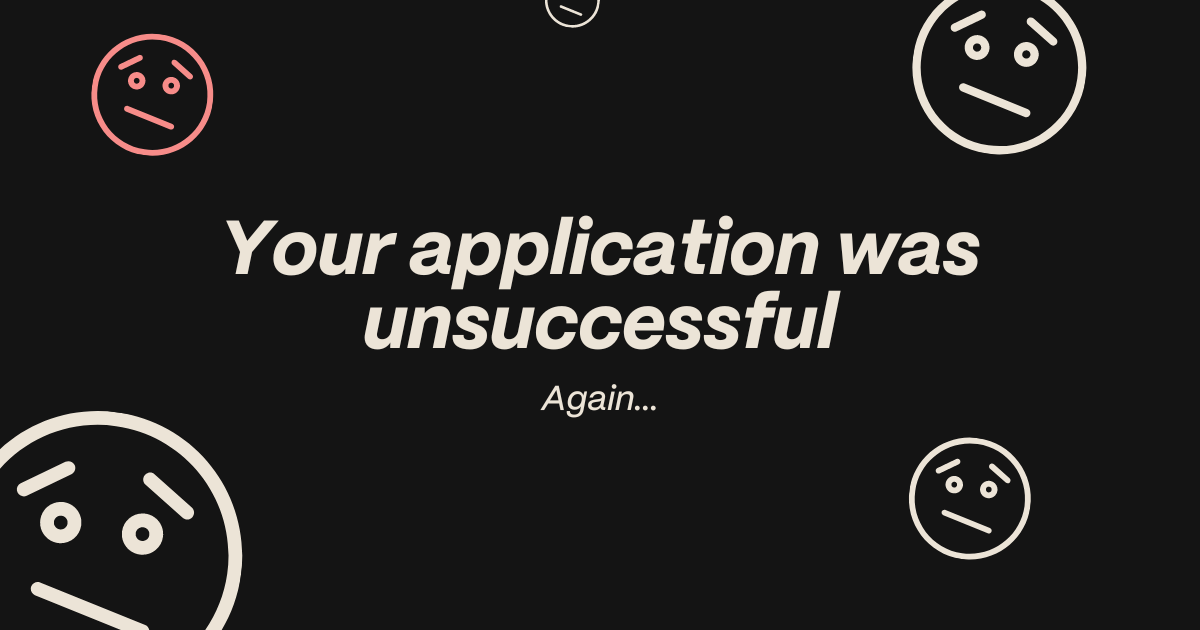
Why you’re not getting hired and what to do
We’ve all faced rejection at some point. It’s a tough pill to swallow!
Especially when you receive those “Thanks, but no thanks” emails.
But have you identified why it happens?
Here are a few reasons why your job applications may be hitting dead ends.
#1: You gave off a bad vibe.
First impressions are everything, give off an unenthused, bored vibe and you’ve already blown it.
You’re going to be nervous and that’s normal but show enthusiasm. Display a positive attitude, prepare for common questions, ask thoughtful questions, and demonstrate your interest in the role.
You are interested, right?
#2: You missed the boat, i.e. applied late.
Act swiftly.
Submit your application as soon as possible after a job posting goes live to increase your chances of being noticed.
And, if you’ve applied but haven’t heard back, follow up strategically. Send a polite and concise follow-up email after a reasonable period (1-2 weeks).
#3: Your CV didn’t stand out.
Polish your CV and ensure it’s well-structured, error-free, and tailored to the role.
The company is looking for a specific applicant. Did your CV reflect the job description? Did you display your experience and skills in a way that shows you’re a capable applicant?
Quantify your impact in past jobs so it’s relevant to the role’s requirements, i.e. “I have [years] experience in [skill/role] & have consistently [positive outcome produced]”.
#4: Sometimes, it’s who you know.
You have the right experience and the interview went well – but another applicant knew someone who knew someone.
Unfortunately, sometimes, this is just the way it goes.
Leverage your existing connections to get recommendations & uncover hidden job opportunities. And keep expanding your network by attending industry events and engaging in online networking platforms.
#5: You lack experience.
This is a hard pill to swallow, but each role is different. Some seek specific experience (i.e. technical positions), while others are looking for attitude, as there’s capacity for training.
There’s no one magic answer, but for those who can, put your hand up for tasks outside your role and discuss with your manager how you can progress in a specific direction.
For those without experience looking for their first role, seek junior and intern/grad roles. They have more capacity for training.
#6: We can’t afford you.
Understand what the salary benchmarks are in your field. Gain insights into industry standards and tailor your expectations accordingly.
To do this, look up salary guides like www.whatsmyworth.co.nz or talk with a recruiter (our team are always happy to help!).
Be open to a negotiation too.
You may have a set figure in mind, but be flexible and willing to discuss compensation during the interview stage. You may still get what you want, but if you show flexibility, it’s a big tick against your name.
#7: Your references didn’t say nice things.
People think it’s just a formality, but reference checks are a very real part of the process.
Select referees who can provide positive and detailed insights into your abilities, work ethic and achievements.
If they get a phone call and talk negatively about you, you’re probably not going to get the job.
Just because you’re told no now doesn’t mean the next one won’t be a yes. Keep trying!
Looking for more job search resources? Check out our ultimate jobseeker guides.

